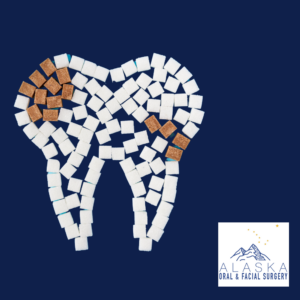 Sugar is often a guilty pleasure, whether it’s in the form of a sweet snack, a fizzy soda, or a hidden ingredient in many of our favorite foods. While it’s easy to indulge in sugary treats, the effect sugar has on your oral health is not so sweet. In this blog post, we’ll explore the hidden dangers sugar poses to your teeth and gums, how it leads to dental issues, and most importantly, how you can protect your oral health.
Sugar is often a guilty pleasure, whether it’s in the form of a sweet snack, a fizzy soda, or a hidden ingredient in many of our favorite foods. While it’s easy to indulge in sugary treats, the effect sugar has on your oral health is not so sweet. In this blog post, we’ll explore the hidden dangers sugar poses to your teeth and gums, how it leads to dental issues, and most importantly, how you can protect your oral health.
How Sugar Damages Your Teeth
The relationship between sugar and dental problems is well-established. But how exactly does sugar harm your teeth? Here’s what happens when you eat sugary foods:
Bacteria and Sugar: A Harmful Interaction
Your mouth is home to hundreds of types of bacteria. While many are beneficial, some are harmful — especially the bacteria that feed on sugar. These harmful bacteria produce acids as they digest the sugars you consume, leading to the breakdown of tooth enamel, the hard outer layer that protects your teeth.
- Acid Attack: The acids produced by bacteria after consuming sugar attack tooth enamel, weakening it over time.
- Enamel Erosion: As the enamel erodes, your teeth become more vulnerable to cavities and decay.
- Cavity Formation: Once the enamel is sufficiently weakened, cavities can form, leading to further dental complications if left untreated.
The Role of Plaque
Plaque is a sticky film of bacteria that forms on your teeth and gums. When sugar is present, plaque becomes even more dangerous. If you don’t clean your teeth properly, plaque can harden into tartar, which irritates the gums and can lead to gum disease.
Frequency of Sugar Intake
It’s not just how much sugar you eat but how often you consume it that affects your teeth. Frequent snacking on sugary foods or sipping sugary drinks throughout the day gives harmful bacteria more time to produce acids, leading to extended periods of acid attack on your enamel. This is why it’s important to limit both the amount and frequency of sugar consumption.
Types of Sugar: What’s the Difference?
Not all sugars are the same. Understanding the different types of sugar and how they impact your teeth can help you make smarter choices.
1. Natural Sugars
These sugars are naturally occurring in foods such as fruits, vegetables, and dairy products. While natural sugars are healthier than added sugars, they can still contribute to tooth decay if not managed properly. The fiber in whole fruits helps reduce the negative impact of natural sugar by stimulating saliva production and rinsing away food particles.
2. Added Sugars
Added sugars are sugars and syrups that are incorporated into foods during processing. Examples include sugary drinks, candy, baked goods, and many processed foods. These sugars pose a significant threat to your teeth because they tend to linger on the enamel, allowing bacteria to produce more acids over time.
- Sugary beverages such as soda, energy drinks, and sweetened teas are especially harmful since they coat the teeth in sugar with every sip.
- Sticky candies and snacks such as caramel, gummies, and dried fruits cling to your teeth and create prolonged exposure to sugar.
3. Hidden Sugars
Many foods that seem healthy may contain hidden sugars that you’re unaware of. Some examples include:
- Flavored yogurt
- Granola bars
- Fruit juices
- Salad dressings
These “hidden” sugars can accumulate over time and lead to unintentional overconsumption, increasing the risk of tooth decay.
The Long-Term Effects of Sugar on Oral Health
The long-term effects of high sugar consumption on your oral health can be severe. Without proper care and attention, these issues can worsen, leading to serious complications.
1. Cavities and Tooth Decay
When enamel wears down due to acid attacks, cavities can form. If left untreated, cavities can penetrate deeper into the tooth, affecting the dentin and pulp. This can lead to tooth pain, infections, and even tooth loss.
2. Gum Disease
Sugary foods and drinks not only harm your teeth but also your gums. Plaque buildup caused by sugar can irritate the gums, leading to gingivitis, the early stage of gum disease. If gingivitis is not addressed, it can progress to periodontitis, a more severe form of gum disease that can result in bone and tooth loss.
3. Bad Breath
Consuming large amounts of sugar can lead to bad breath, as the bacteria feeding on sugar produce foul-smelling gases. Persistent bad breath (halitosis) can be a sign of more serious underlying dental problems.
4. Increased Risk of Infections
In advanced cases of tooth decay and gum disease, untreated cavities or gum infections can lead to abscesses, which are painful pockets of pus caused by bacterial infections. Abscesses require immediate dental care and can sometimes necessitate root canal therapy or even tooth extraction.
How to Protect Your Teeth from Sugar Damage
Fortunately, there are many steps you can take to protect your teeth from the harmful effects of sugar. By adopting healthier habits and practicing good oral hygiene, you can significantly reduce your risk of dental problems.
1. Limit Your Sugar Intake
Reducing your sugar consumption is one of the most effective ways to protect your teeth. Some strategies to help limit sugar intake include:
- Avoiding sugary snacks and drinks, especially between meals.
- Opting for water or unsweetened beverages instead of sugary drinks.
- Choosing whole fruits over fruit juices or sugary snacks.
2. Brush and Floss Regularly
Good oral hygiene is essential for preventing tooth decay and gum disease. Make sure to:
- Brush your teeth twice a day (two minutes each time) with fluoride toothpaste to remove plaque and food particles.
- Floss daily to remove plaque and sugar from between your teeth, where brushing alone can’t reach.
3. Drink Water (Especially Fluoridated Water)
Water is your best friend when it comes to oral health. Drinking water, especially fluoridated water, helps wash away food particles and sugar, while also neutralizing the acids produced by bacteria. Fluoride strengthens your enamel and makes it more resistant to decay.
4. Choose Tooth-Friendly Snacks
Instead of reaching for sugary treats, opt for snacks that are good for your teeth, such as:
- Fresh vegetables and fruits like apples and carrots.
- Dairy products like cheese and yogurt, which help neutralize acids and strengthen enamel.
6. Visit Your Dentist Regularly
Regular dental check-ups and professional cleanings are key to maintaining good oral health.
Sugar and Children’s Oral Health
Children are especially susceptible to the harmful effects of sugar on their teeth. From sugary snacks to fruit juices, kids often consume more sugar than is ideal, which can lead to early tooth decay. As parents, it’s important to monitor your child’s sugar intake and instill good oral hygiene habits early on.
Tips for Protecting Children’s Teeth
- Limit sugary snacks and beverages, especially between meals.
- Encourage your child to drink water instead of sugary drinks.
- Teach them to brush and floss properly, and supervise their oral hygiene routine.
- Schedule regular dental visits to monitor their oral health.
Ready to protect your smile? Schedule an appointment with us today!
At Alaska Oral & Facial, we are dedicated to providing you with the highest quality oral surgery services In cases where sugar has done significant damage, our experienced oral surgeon can help with extractions, dental implants, and other services. Call us today at 907-452-4101 or book your appointment online and take the first step toward a healthier, happier smile!
